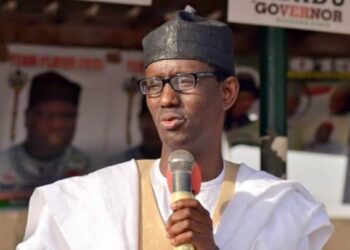Senate, yesterday, officially reacted to Wednesday ruling by a Federal High Court, Abuja, stopping the National Assembly from overriding President Muhammadu Buhari’s veto on the Electoral Act (Amendment) Bill, 2018, which he declined to assent into law.
Consequently, it resolved to write the Chief Justice of Nigeria, CJN, Justice Walter Onnoghen, to call judges to order against meddling into constitutional duties of the National Assembly.
Specifically, the upper legislative chamber wanted the CJN to counsel judges on the need to respect the principle of separation of powers, as well as defend institutions and democracy from being desecrated.
The court, had in a ruling delivered by Justice Ahmed Mohammed, ordered all the parties to maintain status quo antebellum, “at least between now and the next adjourned date”.
Justice Mohammed had invoked Section 6(6) of the 1999 Constitution, as amended, which he said, empowered the court to protect the Res (subject matter) of the substantive suit pending before it.
But the Senate’s Minority Leader, Senator Godswill Akpabio, moved a motion through a Point of Order 42 and 52 of its Standing Rule at the plenary yesterday, saying the judgment amounted to “an abuse of the principle of separation of powers.
” Senator Akpabio (PDP, Akwa Ibom North-west) prayed that the Senate writes the CJN on the matter, which was unanimously granted.
He maintained that no court has the power to stop the parliament from performing its constitutional duties.
“I have perused the Constitution and I discovered that there is nowhere the court was given the power to intervene in the powers of National Assembly.
“I therefore pray that we notify the Chief Justice of Nigeria through writing on the need for the judiciary to respect the principles of separation of power.
“If we didn’t check this now, a time will come when court will, through any order; stop us from passing the budget or performing other constitutional duties.
This (National Assembly) is the core of democracy and there’s principle of the separation of powers which must be respected”, he stressed.
Contributing, the Senate Leader, Senator Ahmad Lawan also stressed the need for court to stop intervening on the constitutional duties of National Assembly, pointing out that “there is separation of powers and interdependence of various arms of government”.
Senator Lawan (APC Yobe North), who cautioned against any act capable of undermining the principle of separation of powers, said “evolution of our democracy is presently at stake.
”
Aliero, Gaya’s soft posture Eff orts by Senator Adamu Aliero (APC Kebbi Central) and Kabiru Gaya (APC Kano North), to water down the Senate’s reaction by urging the body to jettison writing letter to the CJN, but allow its Committee on Judiciary to interface with him on the matter were rejected.
In his remarks, Senate President Bukola Saraki stressed the need for all arms of government to sustain institutions and democracy.
“The issues are very clear.
What is important for us is to sustain the institutions and our democracy.
We are all here today to do our part and one day, we will leave here, but we must strengthen the institution”, he said.
Buhari declines assent It would be recalled that President Muhammadu Buhari had written the National Assembly, declining assent to the new amendment to the Electoral Act, which seeks to reorder the sequence of the polls during general elections.
Buhari in a letter to the Senate read by the Senate President at plenary on Tuesday, said, it became imperative for him to withhold assent to the bill because it will infringe upon the constitutionally guaranteed discretion of the Independent National Electoral Commission (INEC) to organise, undertake and supervise elections provided in Section 15(A) of the third statue to the Constitution.
According to the president in the letter dated 8th March, 2018, the National Assembly got it wrong in the amendment to Section 138 of the principal act to delete two crucial grounds upon which an election may be challenged by candidates, has limited the rights of candidates in elections to a free and fair electoral review process.
Buhari said he vetoed the amendment especially that of Section 152 Subsection (3)-(5) of the Principal Act because it raises Constitutional issues over the competence of the National Assembly to legislate over local government elections.
The letter, entitled, “Presidential Decision to decline Assent to the Electoral (Amendment) Bill, 2018, read: “Pursuant to Section 58(4) of the Constitution of the Federal Republic of Nigeria 1999 (as amended), I hereby convey to the Senate, my decision, on 3rd March 2018, to decline Presidential Assent to the Electoral Amendment Bill 2018 recently passed by the National Assembly.
“Some of my reasons include the following: The amendment to the sequence of elections in Section 25 of the principal act, may infringe upon the constitutionally guaranteed discretion of the Independent National Electoral Commission (INEC) to organise, undertake and supervise elections provided in Section 15(A) of the third statue to the Constitution; “The amend to Section 138 of the principal act to delete two crucial grounds upon which an election may be challenged by candidates, unduly limits the rights of candidates in elections to a free and fair electoral review process; “The amendment to Section 152 Subsection (3)-(5) of the Principal Act may raise Constitutional issues over the competence of the National Assembly to legislate over local government elections”.



